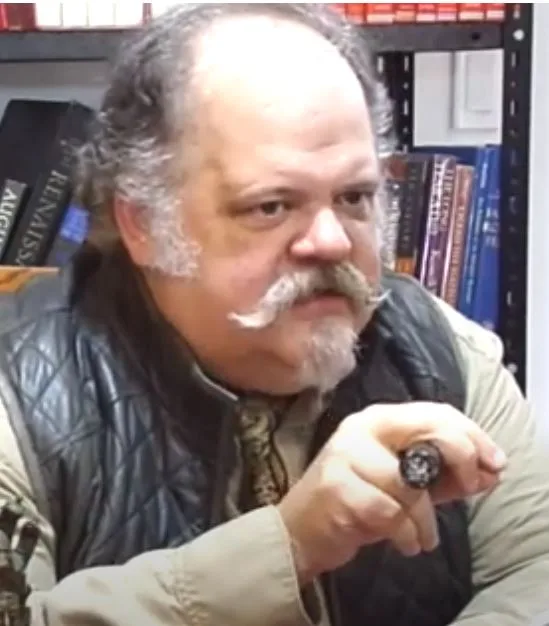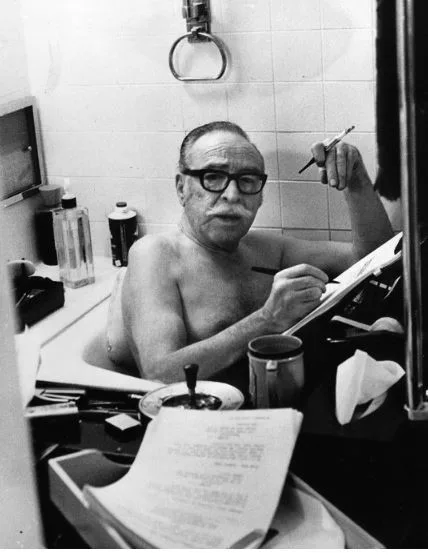Cuenca newcomer Kit Thornton plays blacklisted screenwriter in Community Theater’s dramedy
By John Olson
Azuay Community Theater’s next production is Trumbo: Red, White and Blacklisted. It’s the funny and moving story of the brilliant, but abrasive screenwriter Dalton Trumbo, who stubbornly held to his principles in the face of persecution by the US Congress and the film industry in the era of the Hollywood Blacklist that resulted from the House Un-American Activities Committee (HUAC) hearings in 1947. Those looking for entertainment with both humor and depth will be delighted by the show.

Kit Thornton
The play was an off-Broadway hit in 2003, initially starring Nathan Lane as Trumbo. This larger-than-life character has also been played by many of the best-known actors of our time, like Paul Newman, Liam Neeson, and Alec Baldwin, as well as Bryan Cranston in the dramatic film biography Trumbo.
Taking over this iconic role for ACT is Cuenca newcomer Christopher “Kit” Thornton. The native West Virginian has over 20 professional acting credits and over 30 directing credits on his resume, in such roles as Marc Antony in Julius Caesar, Prospero in The Tempest, and touring to 16 cities the title role of the one-man, hit show Clarence Darrow. See interview excerpts of Kit on Trumbo and on the show at www.actseats.com
The play, by Dalton Trumbo’s son Christopher, is taken primarily from Trumbo’s letters, as well as his testimony before the committee. The cast also includes Derek Weber as “The Narrator” (Christopher Trumbo) and Billy Bragg as “The Committee” and “The Interviewer.” Trumbo: Red, White, and Blacklisted will be performed Friday, August 25 at 4 pm and Saturday, August 26 at 2 pm in the Sala de Carrasco of the Casa de la Cultura, C. Luis Cordero, just south of Parque Calderon Tickets are $15 and may be purchased at www.actseats.com
Trumbo: A role model for principle vs expediency and self-interest
Trumbo paid a steep price for his refusal on principle to answer the questions of the House Un-American Activities Committee (HUAC) that in 1947 began investigating allegations of Communist sympathies within the film industry. When Trumbo was asked by the committee if he was, or had ever been, a member of the Communist Party, he refused to say not only if he had ever been a member of the party, but even if he was a member of the Screen Writers Guild. He declined to directly answer either question, contending that his constitutional rights guaranteed freedom of association and secrecy regarding such associations. He had in fact been a member of the Communist Party, and as Hollywood’s highest-paid screenwriter at that time, it was well known that he was a member of the Screen Writers Guild.

Dalton Trumbo working in the bathtub.
Trumbo had nothing to gain from withholding this information, but his refusal to directly answer the committee’s questions earned him a conviction for Contempt of Congress that was affirmed by the Supreme Court and sent him to a federal prison for eleven months. Worse than his prison sentence, though, was that he and over 200 other writers were denied work for many years by the producers of the motion picture industry, with the formation of the Hollywood Blacklist. Trumbo might have avoided prison by simply answering the committee’s questions and might have avoided the Blacklist by renouncing Communism, but his principles would not allow him to do either.
Thornton brings a unique mix of life experiences to the role
In addition to Thornton’s extensive acting background, he brings life experience that makes him uniquely qualified to play Trumbo. Thornton was a practicing attorney and staff assistant on Capitol Hill in the US Senate. This experience led him to develop strong opinions on what drives politicians to attack certain groups of people as the HUAC members attacked Hollywood screenwriters in 1947.
He says, “I came to know the political mind. It’s not the money, it’s not the power. Is it the fame? No, unless you’re particularly obnoxious or outstanding you’re probably not going to be noticed that much. They do it for the attention – for the affirmation they feel when they get a sound bite on TV. They need to be important, not do important things. And that was exactly what was happening at that particular time in the United States.”
Thornton contends that politicians are not sincerely concerned about many of the causes they use to gain attention. Rather, they jump on the grievances of “a small, angry group of reactionary people who draw their self-worth and the energy of their participation in the political process from their resentments,” and see in these controversies a chance to gain the recognition they crave.

Dalton Trumbo testifying before the U.S. Congress House of Representatives Un-American Activities Committee.
Today’s battle to protect freedom of speech and thought reflected in the story.
Regardless of the politicians’ suspect motives behind joining in crusades against certain groups or ideas, Thornton says the threat to free thinking and open discussion is real and ever-present. “The desire to limit access to ideas is never borne of a desire to protect, it’s borne of a desire to control. Trumbo knew that and I think that was extremely important to him. The idea that people are going to be able to express themselves artistically or intellectually is never a won fight because there’s always the temptation for someone who wants to exercise power rather than influence to attempt to control artistic expression, to rewrite history.”
Suppression of free thinking is a topic Thornton has been deeply involved in prior to taking on the role of Trumbo. Thornton’s novel Lost Child of Paradise, one of his four published novels, is set during West Virginia’s 1974 Kanawha County Textbook Controversy, in which violent protesters sought to ban schoolbooks that they claimed promoted sodomy, communism, and anti-white and anti-American values.
Thornton explains how Trumbo found the problem to be deeper than grandstanding politicians. “Trumbo makes the point that it’s not the committee that’s oppressing him. It’s his former employers. They’re the ones that are refusing to hire him and they’re only doing that because they’re concerned about what it’s going to look like in public. It was a little group of loud people that managed to frighten these studio executives and shake them right down to the jelly of their spines.”
The public was also a loser because of the Blacklist
The writers, who were deprived of their livelihoods and locked out of professional opportunities at the peak of their careers, were not the only ones harmed by the Blacklist. Thornton makes the case that the public lost out on the great art that blacklisted writers might have created. To illustrate his point, he poses this hypothetical question. “You have two potential writers to write your screenplay. One is a person who’s willing to stand up for their principles, who thinks about what moral character is; and the other will write anything you tell him to. Which one is going to write the better script? If you don’t stand up for anything, you can’t make good art.”
Fortunately for all, some of the blacklisted writers were able to sell screenplays under assumed names or through others who “fronted” for them. Trumbo’s acclaimed but uncredited scripts for Roman Holiday and The Brave One are examples of the quality of writing we might have enjoyed had these writers been allowed to work freely.
Thornton to bring the human complexities of Trumbo to life
In spite of the courage and adherence to values Trumbo showed in response to the questions of the HUAC and Blacklist propagated by the film producers, Thornton insists that Trumbo was just a man – not a cause – and intends to portray him as such. “He’s a real person. He’s not altogether likable… not altogether consistent, free of hypocrisy or anger or selfishness. A character like that, people can take to their hearts. Too often when we see someone like this – a person who has suffered an obvious injustice – we try to make them plaster saints. Trumbo was not a plaster saint. Would I like Dalton Trumbo? Yeah. I think we’d probably be pals, but I think we’d probably fight a lot, too, because the man simply did not know how to get through a conversation without a fight.
Drama promises to raise important questions
“Trumbo: Red, White, and Blacklisted is going to make the audience wrestle with questions like how you deal with people when you think they’re wrong. The script by Trumbo’s son Christopher is about Dalton Trumbo’s evolution in how he dealt with people who he was absolutely convinced were absolutely wrong.”
___________________
Trumbo: Red, White, and Blacklisted will be performed Friday, August 25 at 4 pm and Saturday, August 26 at 2 pm in the Sala de Carrasco of the Casa de la Cultura, C. Luis Cordero, just south of Parque Calderon Tickets are $15 and may be purchased at www.actseats.com





















